Dalmatian Dog Grooming & Clean Up Grooming Videos Health & Wellness News & Entertainment Videos
Sweet Dalmatian Puppy Beats the Odds After Being Abandoned & Neglected
Dalia, a Dalmatian mix with a coat besieged by ticks and fleas, found herself amidst a silent struggle at a local animal shelter where she was abandoned in a state of neglect. Her skin, a battlefield marred by the persistent critters, twitched and irritated, yet her spirit was unbroken. Her story gently unfolds in the compassionate hands of Mel, a dedicated groomer, who is committed to help her through her silent suffering to a place of relief and renewal.
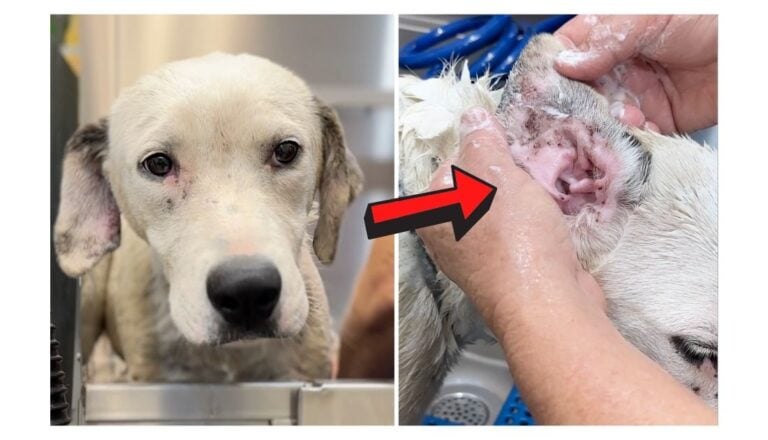
Hundreds of Fleas & Ticks
When Dalia first stepped into the shelter, her black and white coat was marred by the unwelcome presence of ticks and fleas, critters that had made a home in her fur, causing visible irritation and discomfort.
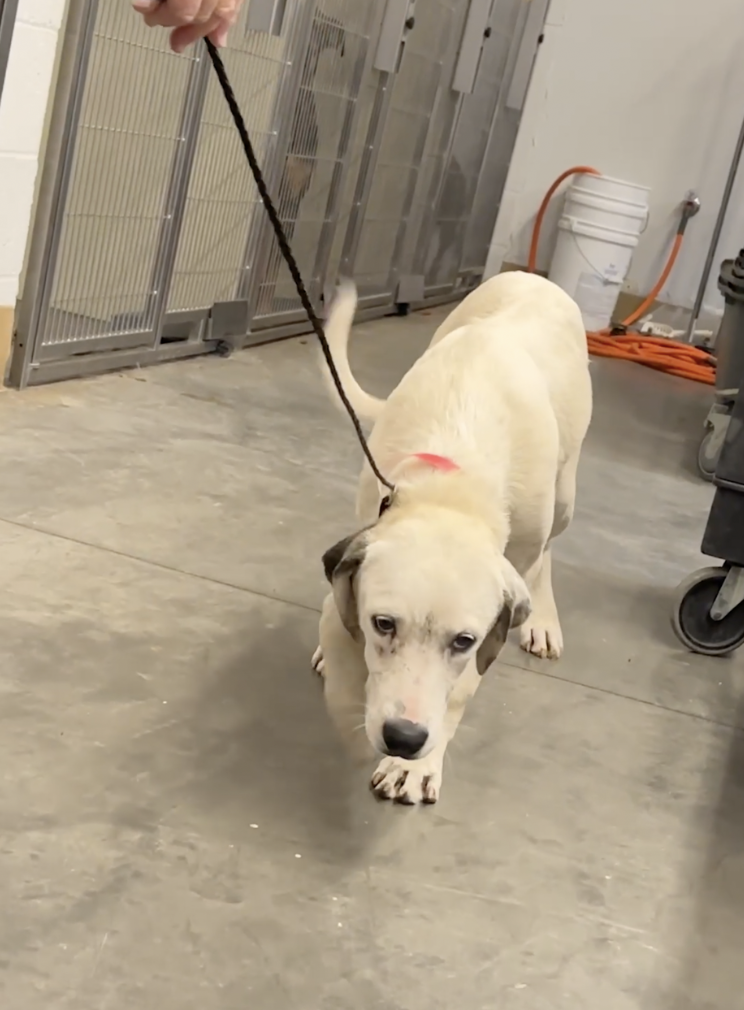
Mel’s hands skillfully navigated through the sea of pests that had laid siege to the poor canine’s skin. “She’s so sweet,” Mel whispered, as she meticulously applied flea and tick treatment, ensuring that every inch of Dalia’s skin was tended to, every hidden critter addressed.
Removing Them Was Arduous
The process was neither quick nor easy. Dalia’s paws had become a hiding place for the dead ticks, a stark reminder of her days, perhaps weeks, of neglect and struggle in the harsh outdoors. Mel could feel them nestled between her toes, am indication of the dog’s past suffering.
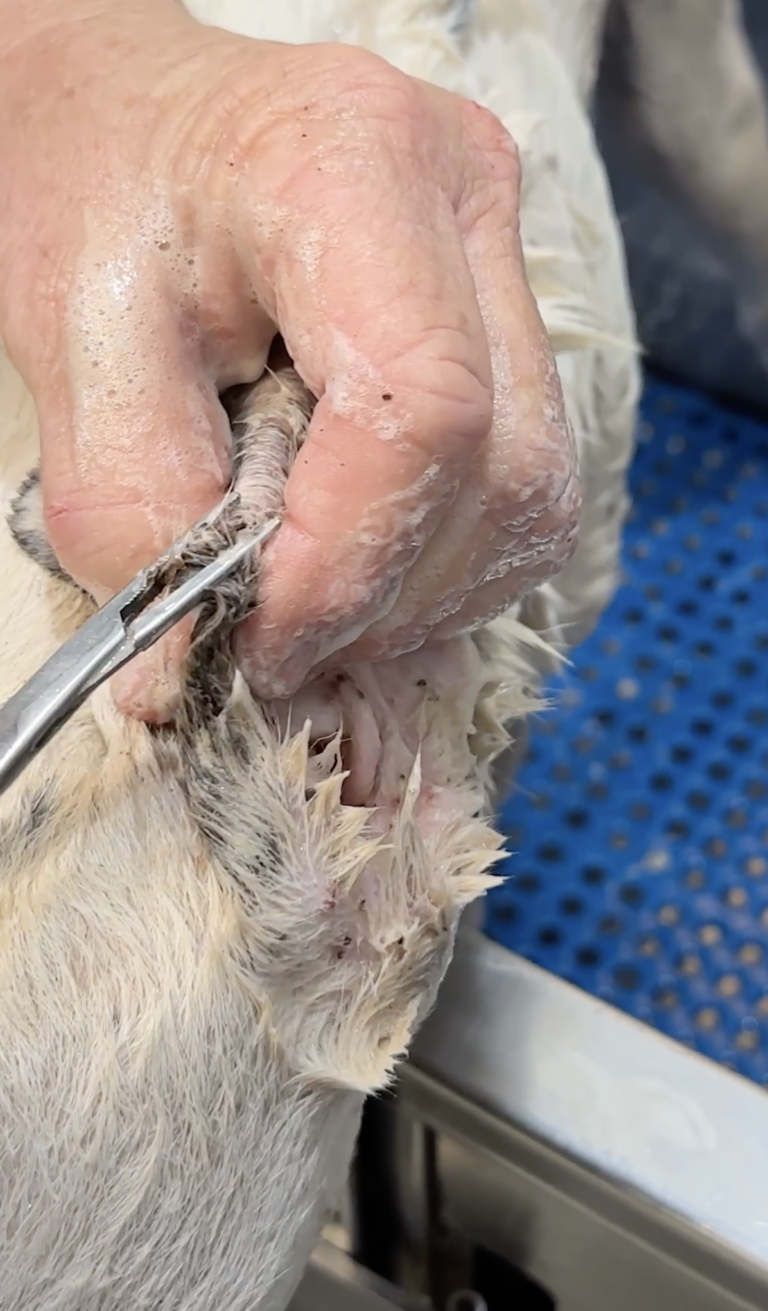
As Mel washed away the dirt and grime, Dalia’s coat began to reveal its true, pristine white hue, a canvas that had been obscured by her unfortunate past.
Dalia’s History Is A Mystery
Dalia’s history is a mystery. Was she a backyard dog, confined and forgotten in her own little world, or a runaway, lost and trying to navigate through the labyrinth of the unknown? Regardless, her present became a sanctuary of care and healing, where her wounds were gently cleansed and her spirit slowly revived.
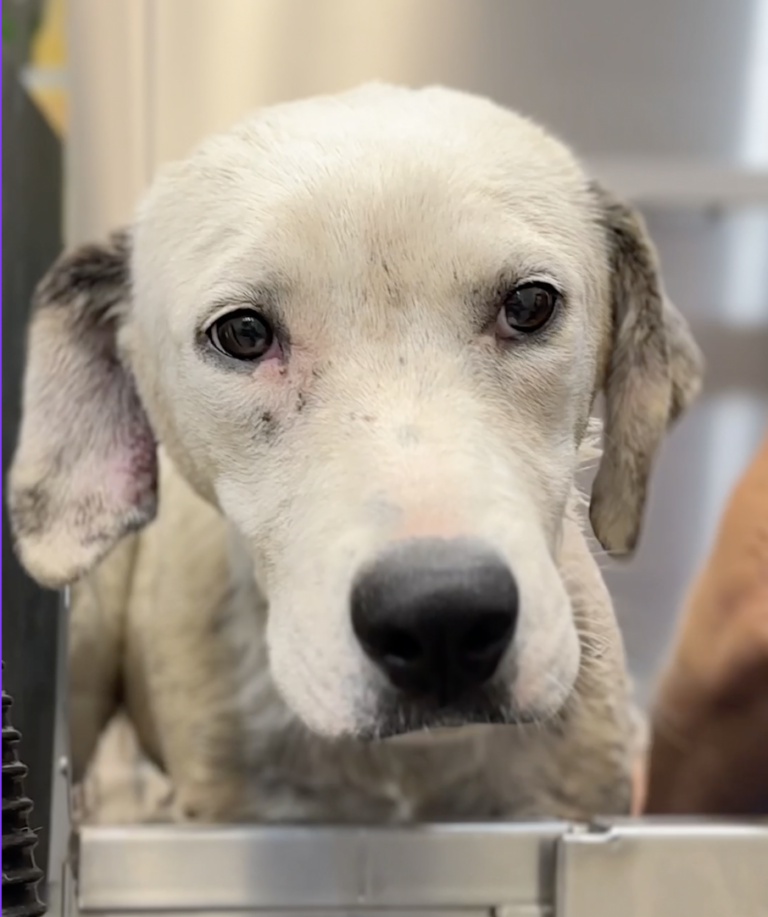
The road to recovery was not without its challenges. Dalia, though initially cooperative and calm, soon grew restless, her patience wearing thin. Her ordeal was further highlighted by Michael, a registered vet tech, who revealed that they had picked off hundreds of ticks from her ears alone, filling an entire bowl with them.
Dalia’s Sweetness Never Waned
Despite the discomfort and the seemingly endless poking and prodding, Dalia’s sweetness never waned. Her eyes, once pleading, began to gleam with a mixture of gratitude and newfound strength. Another round of flea and tick medication was applied, a final fortress against any lingering invaders, allowing Mel to complete her mission and liberate Dalia from her itchy prison.
She Found Her Forever Home
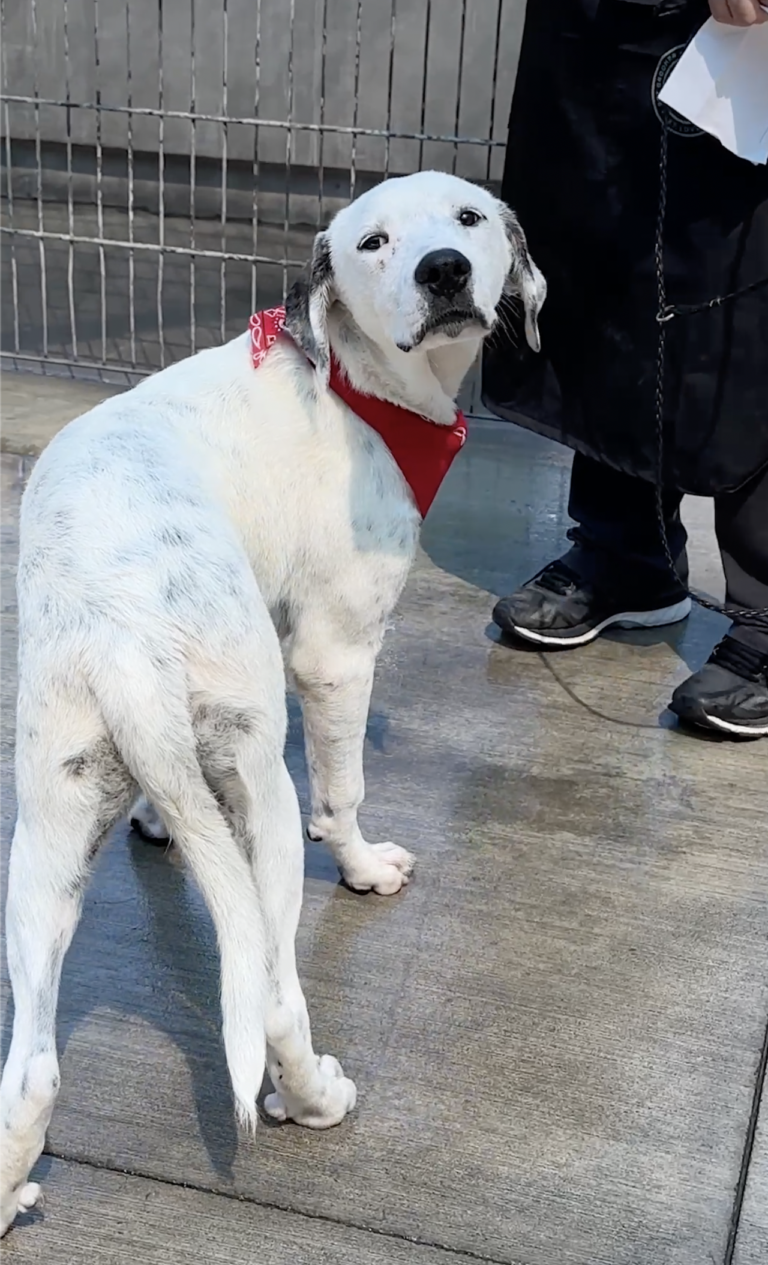
And so, Dalia emerged not just with a gleaming coat, but with a spirit that had triumphed over adversity. Her story did not end in the soothing hands of Mel or the compassionate care of the shelter. Dalia found a forever home, a place where her past would be nothing but a distant memory, replaced by days filled with love, care, and endless adventures.
How To Prevent Fleas & Ticks
Tip 1: Use Preventive Products Year-Round
Ticks and fleas thrive in warm temperatures and are usually a nuisance during the summer months. Because of this, most puppy owners feel like it is only necessary to use tick and flea preventive products in summer, but this is not true.
Some fleas and ticks find their way indoors and can survive during winter, even in places that get sub-zero temperatures. For this reason, vets recommend that puppies should be protected from fleas and ticks all year round.
Most of the preventive products on the market aren’t safe for use in puppies, so you’ll need to have a discussion with your vet for a recommendation or prescription. After getting the product, you need to follow all the instructions on how and when to use it on your puppy.
Expert Tip: There are many options when it comes to flea and tick prevention. You can use spot-on treatment, shampoos, sprays, collars, and oral treatments.
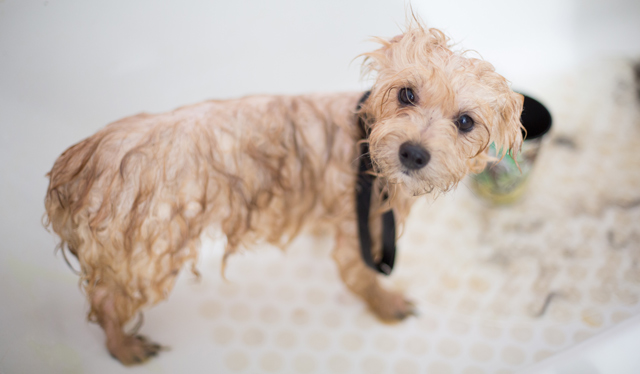
Source: pexels.com
Tip 2: Keep Your Home Flea and Tick-Free
Fleas can find their way onto your puppy, your clothes or the clothes and belongings of your visitors, and then end up inside your home.

Source: pexels.com
If you only focus on keeping your puppy clean, you may miss these other sources, and end up with a persistent infestation inside your home—despite what you’ve done to treat your pup.
To avoid this, you need to regularly wash all your puppy’s bedding, vacuum all your carpets, and treat your home with an anti-parasite fogger, spray, or powder.
Your puppy’s favorite hang-out spots in the house will most likely have the highest concentration of flea larvae and eggs. You should pay extra attention to these when you’re fogging your home.
Expert Tip: If you’re worried that you won’t do a thorough job, you can hire a professional cleaner that specializes in getting rid of fleas and ticks. They’ll ensure that there’s full coverage of your home.
Tip 3: Perform Regular Flea and Tick Checks
Products can go a long way in preventing pests, but the surest way to get rid of fleas and ticks is to always be on the lookout for them. You’ll need to get your hands dirty for this part.
Ticks and fleas thrive in wooded areas, thus, every time you visit such places, you’ll need to check if your puppy picked up any while you were out.
How to Check for Fleas and Ticks
To look for fleas or ticks, carefully brush or comb your puppy’s fur with a fine-toothed comb. Adult fleas are big enough to be seen with the naked and eye and after ticks feed they are visible as well.
If your puppy starts scratching a lot, suspect a flea infestation. If you find any live fleas, wash your puppy with flea shampoo.
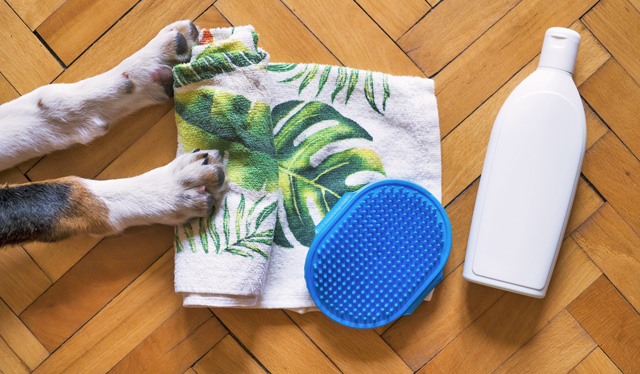
Source: pexels.com
If your puppy is in the wrong place at the wrong time, he may end up getting bit by a tick. Tick bites do not itch as much as a flea infestation does; because of this, they usually get overlooked.
Ticks tend to prefer to attach to the neck, ears, head, and feet. Pay extra attention to these areas while you’re checking.
If you find a tick on your puppy’s skin, carefully remove it straight away as this will reduce the likelihood of it causing an infection. For best results, use a pair of tweezers to grasp the tick close to its head and pull it off the skin. Always make sure the head comes out of the skin.
When the tick has been removed, clean the spot that it was attached to with hydrogen peroxide or alcohol to prevent infection.
Expert Tip: Even if your puppy is rarely ever in the woods, he can still pick up fleas when he’s in your garden or at the dog park. In such cases, a weekly check will suffice.
Tip 4: How to Prevent Flea and Tick Bites
You can’t always avoid going outdoors with your puppy. Here are a few tips that you can use to keep your puppy tick-free when you’re outdoors:
- Don’t let your puppy roam free in wooded or grassy areas. If you decide to go on a hike, stick to the designated trail.
- Keep your garden lawn mowed and your hedges trimmed so that ticks have nowhere to hide in your yard.
- Get rid of leaf piles in your yard.
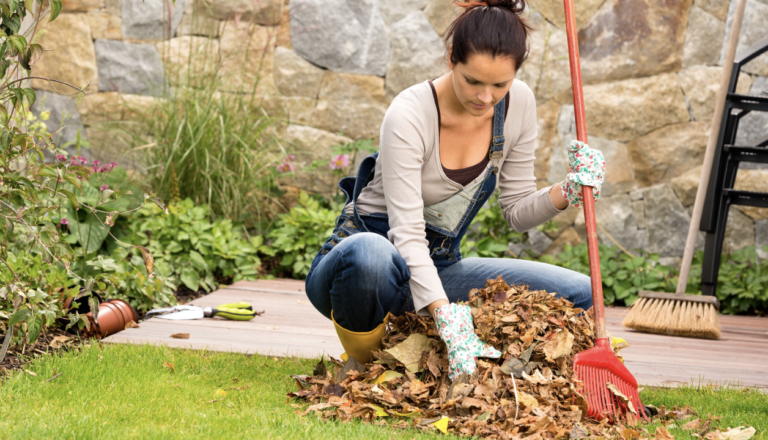
Fleas are much easier to get than ticks. Here are a few tips that you can use to keep fleas off your puppy:
- Fleas like to breed in warm places and they hate cedar. If you’re looking for a solid way to keep fleas off your puppy, get him a cedar bed.
- Fleas hate all things citrus and won’t be a fan of your puppy if you sprinkle some citrus juice on his fur.
- Mix essential oils with water in a spray bottle then spray your puppy’s bed with the mixture. This will deter fleas by acting as a repellent. Be sure to ask your vet which essential oils are safe to use, especially if you have other pets.
- Add a tablespoon of vinegar to your puppy’s bath water to prevent fleas.
Tip 5: Never Miss Your Puppy’s Yearly Checkup
You should always take your puppy for his checkups. When you go for your yearly checkup, the vet will check for any signs of fleas or ticks.

The vet will also determine if the preventive products you’re using are suitable for your puppy and if they’re effective. If your puppy was already bitten and has any signs of disease resulting from the bites, the vet will catch those early and treat your puppy.
Expert Tip: Look out for any changes in your pet’s behavior and if there’s evidence of any limping, loss of appetite or if your puppy is lethargic, call the vet straight away.
Related Articles
- Fleas and Ticks: 5 Clever Prevention and Treatment Tips for Your Pup
- How Does a Deaf and Blind Puppy Climb Stairs? Piglet’s Story Will Inspire You
- No One Wanted This Two-Legged Dalmatian Until This Happened…
- What the Heck is a Long Haired Dalmatian?




